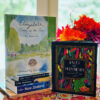

When I started out in nursing care I started in group homes filled with men with a purported mental age of 0-18 months, all non-verbal, some violent. All state institutionalised since birth or toddlerhood, all abused by doctors, nurses, care aids: both or all. All with different mental or development delays some just termed “mongoloid”, it was the 1980s. I absolutely loved this work. Interesting fact the workers in my set of homes were activist and or misfits as well, use to society not wanting us seen. As these men had never lived in a home or had family meals together we tried our best to create this. School or more like daycare was where Monday to Friday the men spent time with others from homes and were taught daily living skills. I even took all of them to Lincoln park zoo in Chicago for a day much to the dismay of others but you know what. Everyone was kind to us at the zoo. Children asked questions we answered them. We then made sure to take them to our local city zoo, museums, parks, movies. It was amazing to see such joy on their faces.
I have toured an abandoned State Hospital in my state. It still haunts me. I could not stop looking at the hallways and barbed windows.
Reading this book I had so many relatable moments, they are too many to recount.
This is an important read. A subject swept under the rug for all of time. I don’t have the answer but I do know for sure to my very soul that neither does anyone else.
The author actually commented on my IG POST. Always fun.
Doctors have struggled for centuries to define insanity–how do you diagnose it, how do you treat it, how do you even know what it is? In search of an answer, in the 1970s a Stanford psychologist named David Rosenhan and seven other people–sane, healthy, well-adjusted members of society–went undercover into asylums around America to test the legitimacy of psychiatry’s labels. Forced to remain inside until they’d “proven” themselves sane, all eight emerged with alarming diagnoses and even more troubling stories of their treatment. Rosenhan’s watershed study broke open the field of psychiatry, closing down institutions and changing mental health diagnosis forever.
But, as Cahalan’s explosive new research shows in this real-life detective story, very little in this saga is exactly as it seems. What really happened behind those closed asylum doors?


